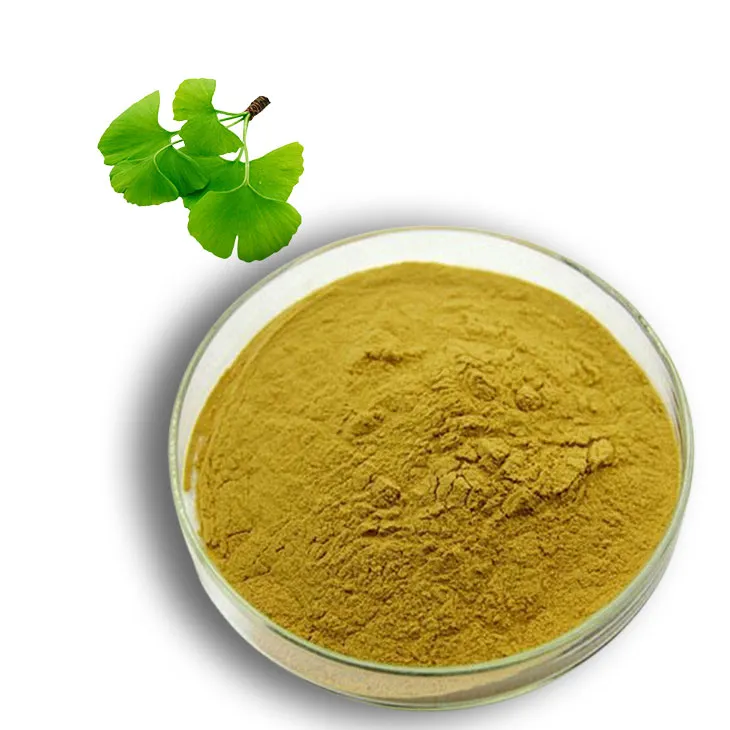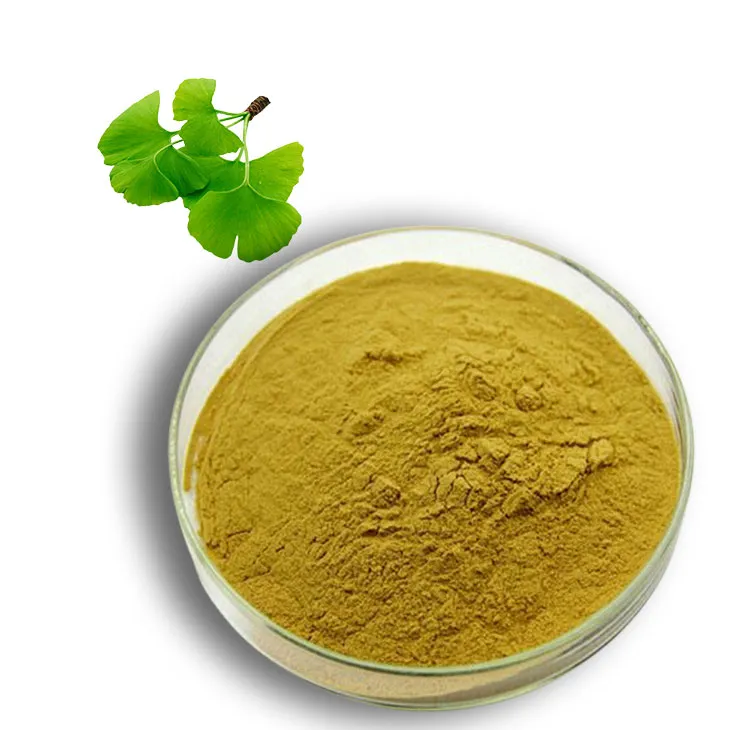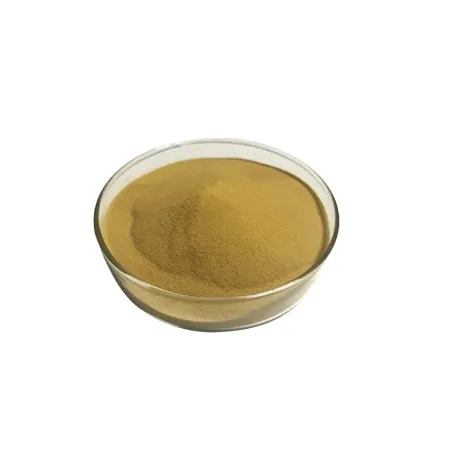- 0086-571-85302990
- sales@greenskybio.com
Components of Ginkgo biloba extract in fertilizers and feeds.
2024-11-28

1. Introduction
The Ginkgo biloba extract has recently attracted significant attention in the fields of fertilizers and feeds. This is mainly due to its complex and potentially beneficial chemical components. Ginkgo biloba, a living fossil plant, has been used in traditional medicine for centuries. Now, its extract is being explored for new applications in agriculture and animal husbandry.

2. Chemical Components of Ginkgo biloba Extract
2.1 Flavonoids
Flavonoids are a major group of components in Ginkgo biloba extract. They include flavone glycosides such as Quercetin, kaempferol, and isorhamnetin glycosides. These flavonoids possess antioxidant properties. In fertilizers, they can help plants resist oxidative stress caused by environmental factors such as pollution and extreme weather. For example, in urban areas where plants are exposed to high levels of pollutants, the antioxidant action of flavonoids can protect plant cells from damage. In feeds, flavonoids can have positive effects on animal health. They may enhance the antioxidant capacity of animals, which is important for preventing various diseases related to oxidative damage in livestock and poultry.
2.2 Terpenoids
Terpenoids are another important part of the Ginkgo biloba extract. Ginkgolides and bilobalide are the main terpenoids present. These terpenoids have been shown to have anti - inflammatory properties. In fertilizers, they may play a role in promoting plant growth by reducing inflammation - like responses in plants. For instance, when plants are infected by pathogens, they may exhibit a form of "inflammatory" response. Terpenoids can help modulate this response and allow plants to better allocate resources for growth. In feeds, terpenoids can help reduce inflammation in animals. This is particularly beneficial for animals in intensive farming systems where stress - related inflammation is common.

3. Advantages of Ginkgo biloba Extract in Fertilizers
3.1 Enhanced Nutrient Uptake
The components of Ginkgo biloba extract can improve the efficiency of nutrient uptake by plants. Flavonoids, for example, can interact with plant roots and soil particles. They can chelate certain nutrients, making them more available for plant uptake. This means that plants can absorb essential nutrients such as nitrogen, phosphorus, and potassium more effectively. As a result, the use of fertilizers containing Ginkgo biloba extract can lead to better - nourished plants with improved growth and development.
3.2 Stress Tolerance
As mentioned before, the antioxidant and anti - inflammatory properties of the extract help plants tolerate various stresses. In addition to oxidative stress and pathogen - induced stress, plants may also face drought, salinity, and temperature stress. The components of Ginkgo biloba extract can act as signaling molecules in plants, triggering defense mechanisms against these stresses. For example, when a plant is exposed to drought, the extract may help the plant close its stomata more effectively to reduce water loss, while still maintaining photosynthetic activity.

4. Advantages of Ginkgo biloba Extract in Feeds
4.1 Improved Animal Health
The antioxidant and anti - inflammatory effects of Ginkgo biloba extract are also beneficial for animals. In livestock and poultry, oxidative stress can lead to reduced productivity, poor meat quality, and increased susceptibility to diseases. By enhancing the antioxidant capacity of animals, the extract can help maintain their health. Anti - inflammatory effects can also reduce the occurrence of inflammatory diseases such as arthritis in animals, which can improve their welfare and productivity.
4.2 Enhanced Nutritional Value
Some components of the Ginkgo biloba extract may also have an impact on the nutritional value of animal products. For example, they may influence the fatty acid composition in meat or eggs. This can lead to the production of healthier and more desirable animal products for consumers. Additionally, the extract may improve the digestibility of feeds, allowing animals to better utilize the nutrients present in their diet.

5. How Ginkgo biloba Extract Functions in Fertilizers
5.1 Interaction with Soil Microorganisms
The Ginkgo biloba extract can influence the soil microbiome. It can promote the growth of beneficial microorganisms such as nitrogen - fixing bacteria and mycorrhizal fungi. These microorganisms play crucial roles in nutrient cycling and plant - soil interactions. For example, nitrogen - fixing bacteria can convert atmospheric nitrogen into a form that plants can use. Mycorrhizal fungi can help plants absorb water and nutrients more effectively. By promoting the growth of these microorganisms, the extract indirectly benefits plant growth.
5.2 Regulation of Plant Hormones
Components of the Ginkgo biloba extract can also interact with plant hormones. They may regulate the synthesis, transport, and signal transduction of hormones such as auxins, cytokinins, and gibberellins. These hormones are essential for plant growth and development. For instance, auxins are involved in cell elongation and root development. By regulating plant hormones, the extract can influence plant architecture, flowering, and fruiting.
6. How Ginkgo biloba Extract Functions in Feeds
6.1 Absorption and Metabolism in Animals
When animals consume feeds containing Ginkgo biloba extract, the components are absorbed in the digestive tract. Flavonoids and terpenoids are metabolized in the liver and other organs. Their metabolites can then be distributed throughout the body to exert their antioxidant and anti - inflammatory effects. The absorption and metabolism of these components may be affected by factors such as the animal species, diet composition, and gut microbiota.
6.2 Impact on Immune System
The Ginkgo biloba extract can modulate the animal's immune system. It can enhance the activity of immune cells such as macrophages and lymphocytes. This can improve the animal's ability to resist infections. For example, in poultry, the extract may help protect against viral and bacterial infections, reducing the need for antibiotics and promoting sustainable farming practices.
7. Conclusion
The Ginkgo biloba extract contains a variety of components that offer potential benefits in both fertilizers and feeds. Its flavonoids and terpenoids play important roles in antioxidant, anti - inflammatory, and other functions. In fertilizers, it can enhance nutrient uptake, stress tolerance, and interact with soil microorganisms and plant hormones. In feeds, it can improve animal health, enhance nutritional value, and impact the immune system. However, more research is still needed to fully understand its mechanisms of action and optimize its use in these applications. With further study, the Ginkgo biloba extract may become a valuable addition to the fields of agriculture and animal husbandry.
FAQ:
What are the main components of Ginkgo biloba extract?
The main components of Ginkgo biloba extract include flavonoids, terpenoids (such as ginkgolides and bilobalide). Flavonoids are known for their antioxidant properties, while terpenoids play important roles in various biological activities.
How can Ginkgo biloba extract components benefit plant nutrition in fertilizers?
The flavonoids in Ginkgo biloba extract can enhance the plant's antioxidant defense system. This helps plants resist environmental stresses such as drought, salinity, and disease. The terpenoids may also play a role in promoting root growth and nutrient uptake, which can improve overall plant health and productivity.
What are the advantages of using Ginkgo biloba extract in feeds for animal nutrition?
The components of Ginkgo biloba extract can have positive effects on animal health. For example, the antioxidant properties of flavonoids can help reduce oxidative stress in animals. It may also improve the immune function of animals, leading to better growth performance, disease resistance, and overall well - being.
How do the components of Ginkgo biloba extract function in fertilizers?
The components interact with plants in multiple ways. Flavonoids can stimulate the production of certain enzymes in plants that are involved in nutrient metabolism. Terpenoids may enhance the communication between plants and soil microorganisms, which can improve the availability of nutrients in the soil and their uptake by plants.
How do the components of Ginkgo biloba extract function in feeds?
In feeds, the components can be absorbed by animals during digestion. The flavonoids can scavenge free radicals in the animal's body, protecting cells from damage. The terpenoids may have regulatory effects on the animal's physiological processes, such as digestion and metabolism.
Related literature
- The Chemical Components of Ginkgo biloba Extract and Their Applications in Agriculture"
- "Ginkgo biloba Extract in Animal Feed: A Review of Its Nutritional Benefits"
- "Analysis of Ginkgo biloba Extract Components and Their Impact on Plant and Animal Nutrition"
- ▶ Hesperidin
- ▶ citrus bioflavonoids
- ▶ plant extract
- ▶ lycopene
- ▶ Diosmin
- ▶ Grape seed extract
- ▶ Sea buckthorn Juice Powder
- ▶ Beetroot powder
- ▶ Hops Extract
- ▶ Artichoke Extract
- ▶ Reishi mushroom extract
- ▶ Astaxanthin
- ▶ Green Tea Extract
- ▶ Curcumin Extract
- ▶ Horse Chestnut Extract
- ▶ Other Problems
- ▶ Boswellia Serrata Extract
- ▶ Resveratrol Extract
- ▶ Marigold Extract
- ▶ Grape Leaf Extract
- ▶ blog3
- ▶ blog4
-
100% Organic Calendula Extract.
2024-11-28
-
Wholesale Mulberry Leaf Extract Suppliers.
2024-11-28
-
China Aguaje Extract Powder Factory.
2024-11-28
-
Mulberry Extract Suppliers.
2024-11-28
-
Active components in aguaje extract.
2024-11-28
-
Standard - process cocoa extract.
2024-11-28
-
Organic Saw Palmetto Extract Powder Factory.
2024-11-28
-
Suppliers of Organic Açai Extract Powder.
2024-11-28
-
Sophora Japonica Flower Extract
2024-11-28
-
Coconut Water Powder
2024-11-28
-
Yellow Pine Extract
2024-11-28
-
Bilberry Extract
2024-11-28
-
Sophora Flavescens Root Extract
2024-11-28
-
Phyllanthus Emblica Extract
2024-11-28
-
Mulberry Extract
2024-11-28
-
Fig Extract
2024-11-28
-
Cat Claw Extract
2024-11-28
-
Medicinal Marshmallow Extract
2024-11-28





















